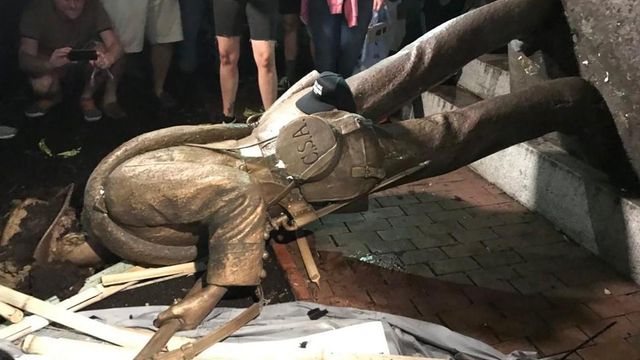Civil rights group challenging 'Silent Sam' deal
A national civil rights group is working with UNC-Chapel Hill students and faculty to challenge the school's recent settlement with the Sons of Confederate Veterans to ensure the "Silent Sam" monument wouldn't return to campus.
Posted — Updated"We urge the BOG to carefully consider this information and to take all necessary action to meet is fiduciary obligations to protect UNC’s interests and to recover the 2.5 million dollars to be paid to support a white supremacist organization whose values are antithetical to UNC’s mission," attorneys Mark Dorosin, Elizabeth Haddix and Jon Greenbaum wrote in the letter.
Monument backers insisted that it return to campus under a 2015 state law governing such memorials on public property, but student, faculty and alumni groups were adamant that the monument not return, calling it a racist symbol of the past.
University officials have maintained that the consent order settled the issue once and for all, allowing UNC-Chapel Hill to move forward.
Boyd Sturges, the attorney who negotiated the settlement for the SCV, said Wednesday that the group did have legal standing to sue over Silent Sam. He declined to comment on a potential lawsuit over the deal.
Although the Board of Governors didn't approve the consent agreement – a board committee did the same day a judge signed the deal – Dorosin's group is seeking to intervene in court on behalf of students and faculty if the board doesn't rescind the deal.
Meanwhile, UNC-Chapel Hill Interim Chancellor Kevin Gusciewicz wrote a letter Wednesday to UNC Interim President Dr. Bill Roper and Randy Ramsey, chairman of the Board of Governors, asking that the board and the university system put any necessary restrictions in place to limit the $2.5 million to preserving the Silent Sam monument.
SCV officials have said they could use some of the money for a new headquarters and a "historically accurate environment" for the monument, and Guskiewicz said he fears they would " promote an unsupportable understanding of history."
"I join with others on my campus in stating that the values expressed by the SCV are inconsistent with and antithetical to the values of the University. In addition, I am deeply concerned by the comments from SCV regarding their intended use of funds from the charitable trust," he wrote in the letter.
Related Topics
• Credits
Copyright 2024 by Capitol Broadcasting Company. All rights reserved. This material may not be published, broadcast, rewritten or redistributed.





